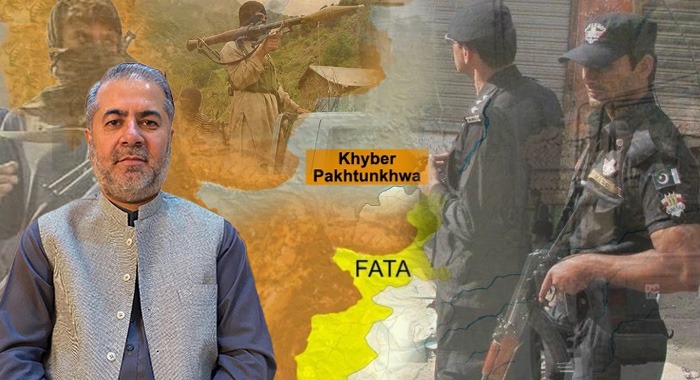Khyber Pakhtunkhwa (KP) stands at the front-line of Pakistan’s war against terrorism, yet its police force remains painfully unequipped, its governance fractured, and its strategy, if one exists at all, disturbingly short-sighted.
Over the years, we’ve seen visible improvements in police infrastructure compared to 15 years ago. Training centres have been established, new vehicles acquired, and upgraded weapons introduced. But this progress is dwarfed by the scale of the challenge KP faces today. The nature of conflict has evolved, and terrorism is no longer sporadic, it is organised, well-funded, and increasingly complex. Sadly, our police remain under-prepared for this war.
To understand the current crisis, we must look back. Before terrorism took root, the KP police were trained primarily for street crime control; thefts, domestic disputes, and routine criminal activity. They were not prepared for urban warfare or asymmetric threats. When terrorism began escalating around 2007–2008, it brought with it a new, deadlier battlefield for which the KP police had no training, no specialised units, and no psychological preparation.
The initial years of terrorism witnessed devastating losses within the force. Casualties soared, not because the police lacked courage, but because they lacked preparation. Over time, reforms came, better training facilities, new vehicles, modern weapons, and a larger budget. But even with all these changes, the police today remain under-equipped and overstretched, particularly in the newly merged districts.
Let’s be honest: the KP police are brave, incredibly brave, but bravery without resources cannot defeat insurgency. Most officers still use outdated AK-47s, patrol with empty fuel tanks, and are deployed in regions where even basic logistics are missing. I’ve seen cases where the petrol for police vehicles had to be arranged using fines collected from petty crime suspects. If that doesn’t reflect a systemic failure, what does?
Even in Peshawar, the provincial capital, police departments struggle to fuel their patrol vehicles. In some cases, money recovered from petty criminals is used to buy fuel. If this is the state of law enforcement in the capital, imagine the state of security in remote border areas.
The situation in the former tribal districts, merged with KP in 2018, is even more alarming. These are front-line regions bordering Afghanistan, and yet they are policed by officers who lack weapons, vehicles, and even the basic training needed for counterinsurgency. The old tribal levies, many of whom wore nothing more than ‘shalwar kameez’ and carried obsolete rifles, have been absorbed into the KP police without proper transition. The result? Entire areas now depend more on the army and Frontier Corps than on a functioning provincial police force.
These former FATA areas, including Bajaur, North and South Waziristan, and Kurram, were merged into KP in 2018. Since then, police presence there has been largely symbolic. Officers lack weapons, vehicles, and even the basic operational infrastructure to patrol or investigate incidents. Many of the tribal levies absorbed into the force were never properly trained, yet they were issued uniforms and handed new responsibilities, without the tools or experience to match.
Meanwhile, the families of martyred police officers continue to suffer in silence. I’ve personally witnessed the painful bureaucratic circus they must endure to receive the martyrdom compensation packages owed to them. These are families of men who died defending this country, and yet they are forced to run from office to office, their grief compounded by red tape.
Let me be clear: the police are not the problem, the system is. These officers remain courageous and committed despite being failed by the very institutions they serve. And the failure doesn’t end with equipment or funding, it extends to how we treat their families. I’ve personally helped families of martyred officers fight through bureaucracy just to claim their rightful compensation. The process is humiliating, slow, and often impossible without media or political pressure.
But the most concerning failure is not logistical, it’s strategic.
There is no coherent counter-terrorism policy in KP. The provincial government does not appear to own this war. I have spoken to elected officials who openly admit they prefer silence over confrontation. Some even imply a “soft corner” for terrorists. Their so-called strategy? Send MPAs across the border to negotiate with the Taliban via the Afghan government. A symbolic act, perhaps, but one that underscores the absence of any long-term counterinsurgency doctrine.
Negotiation alone will not fix what is now a deeply embedded problem. Terrorists aren’t just hiding in caves, they are operating within communities, intimidating civilians, launching grenade attacks, and threatening anyone who dares speak out. And yet, the KP police are being asked to do more with less. There are no proactive raids, no major arrests, no visible dismantling of terror networks.
While we often speak of bravery and sacrifice, we seldom talk about the imbalance between the expectations placed on KP’s law enforcement and the actual resources, training, and support they receive.
Worse still, governance is in a “wait-and-see” mode. The KP government reacts only after being attacked. This reactive approach has allowed terrorists to regroup, rearm, and reassert themselves. As a result, terrorist incidents have increased, and with them, the fear that the state is either unwilling or unable to respond.
This is not KP’s war alone. It is Pakistan’s war. But the federal-provincial disconnect, political divisions, and blame-shifting have created a vacuum, one that terrorists are rapidly exploiting. Until all provinces, federal authorities, and the security establishment unite under a clear, national-level strategy, this problem will persist.
Peace in KP is not just a regional concern, it is a matter of national survival. And unless we stop treating it as a provincial inconvenience and start addressing it as a national emergency, we will continue to bury brave police officers, abandon their families, and lose more ground to those who seek to destroy the fabric of our nation.





